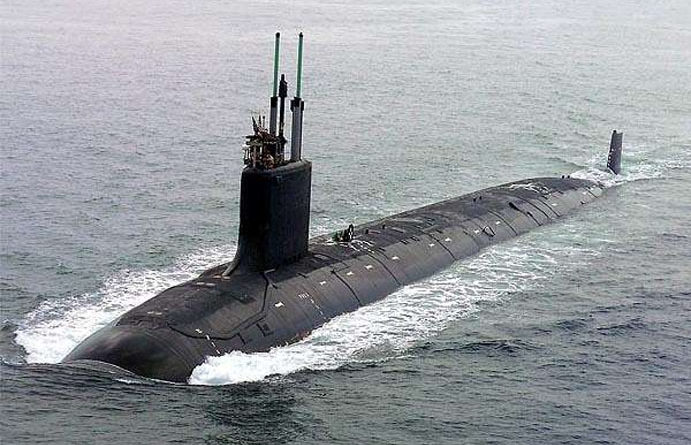How The ‘Contract Of The Century’ Fell Apart
Paris (AFP) Sept 22, 2021
Australia’s scrapping of a massive multi-billion-euro contract for the purchase of French submarines has led to a diplomatic crisis between France and its erstwhile allies in Canberra and Washington.
Here is a timeline of the spat:
‘Contract Of The Century’
On December 20, 2016, France and Australia sign what is dubbed a “contract of the century” that copperbottoms their alliance in the Pacific.
Under the deal France’s Naval Group, which is partly state owned, will build 12 conventionally powered submarines for Australia, based on France’s new Barracuda nuclear-powered subs, which are soon due to enter service
The contract is worth Aus$50 billion ($36.5 billion, 31 billion euros) on its signing in 2016, but later revalued to 56 billion euros to take account of inflation over the length of the programme.
Under the accord the two countries are to cooperate over 50 years and the submarines be constructed in an Adelaide shipyard, with the delivery of the first sub slated for 2030.
The project is expected to create some 2,800 jobs in Australia, according to the Australian government.
Naval Group Criticised
However Australia claims Naval Group are running behind schedule and over budget.
The group’s CEO Pierre Eric Pommellet goes to Adelaide for three weeks in February to take part in fraught negotiations.
On June 2, Greg Moriarty, the top civil servant in Australia’s Department of Defence, sets alarm bells ringing in Paris after he raises the possibility of “alternatives” to the French deal because of ongoing difficulties.
Later in June, during a visit by Australian Prime Minister Scott Morrison to Paris, President Emmanuel Macron promises “full and complete” commitment to the deal.
As recently as August 30, defence and foreign ministers from Australia and France “underline the importance of the Future Submarine programme”.
Contract Ditched
Events take a dramatic turn on September 15 when Morrison announces that Australia will procure more silent nuclear-powered US submarines as part of a surprise new defence alliance — AUKUS — between Britain, Australia and Washington in the Indo-Pacific region.
Under the deal Australia will no longer buy the French submarines.
Furious France calls the U-turn “a stab in the back”.
The White House says its officials held high-level talks with Paris before announcing the deal, but France insists it was taken by surprise.
Paris Recalls Ambassadors
On September 17 Paris recalls its ambassadors to Canberra and Washington, an unprecedented act.
Foreign Minister Jean-Yves Le Drian calls the crisis “serious” saying “there has been lying, duplicity, a major breach of trust and contempt”.
Paris cancels a meeting planned this week between the French Defence Minister Florence Parly and her British counterpart Ben Wallace.
Morrison says the French government would have known Canberra had “deep and grave concerns” about French submarines.
EU Backs Paris
The European Union supports France on September 20, with chief Ursula von der Leyen saying France has been treated in an “unacceptable” way.
A day later German Europe Minister Michael Roth says France’s diplomatic crisis with the US is a “wake-up call for all of us”.
He says the often divided EU must unite on foreign and security policy.
German Foreign Minister Heiko Maas says the decision “and the manner in which it was decided, was irritating and disappointing, and not only for France.”
Biden Talks, Johnson Snipes
US President Joe Biden and Macron hold phone talks Wednesday, with both agreeing that “open consultations among allies” could have avoided the crisis.
After the talks, Macron orders the French ambassador to return to the US next week.
But as Biden pledges support to Macron’s idea for stronger European defence to complement the NATO military alliance, British premier Boris Johnson pours fuel on the fire. He tells France to “prenez un grip” in cod French during a visit to Washington, adding, “Donnez-moi un break” after Drian had accused Britain of “constant opportunism”.
Courtesy: SpaceWar
French Sub Builder To Send Australia Invoice ‘In A Few Weeks’Paris (AFP) Sept 22, 2021 France’s Naval Group said Wednesday it will send a “detailed and calculated proposal” to Australia in the coming weeks of the costs it expects Canberra to pay for scrapping a massive contract to purchase French submarines. Australia in 2016 agreed to buy 12 diesel-powered submarines built by Naval Group in a deal dubbed the “contract of the century” worth Aus$50 billion ($36.5 billion, 31 billion euros), later revalued to 56 billion euros. However last week Australia ditched the deal in favour of nuclear-powered submarines from the United States and Britain, in a secretly negotiated agreement that infuriated Paris and sparked a diplomatic row. Naval Group CEO Pierre Eric Pommellet told France’s Le Figaro newspaper on Wednesday that a bill would be sent to Australia “in a few weeks”. “Australia terminated the contract for convenience, which means that we are not at fault,” he said. “It is a case that is planned for in the contract and will require a payment of our costs that were incurred and those to come, linked to demobilisation of infrastructure and IT as well as the redeployment of employees,” he added. “We will assert our rights.” Australia had previously complained that the deal with Naval Group, which is partly owned by the French state, was years behind schedule and well over budget. France’s defence ministry has said Naval Group has already started talks about a financial settlement with Canberra. Naval Group had already completed 900 million euros ($1.1 billion) in work on the submarines, the ministry said, but suffered no losses as the work was covered by Australian payments already made. But calling the pullout “a betrayal”, the ministry said the talks would now determine the size of “compensations and damages” owed by Australia. Pommellet told Le Figaro that “this decision was announced to us without any prior notice, with unprecedented brutality.” |
Courtesy: SpaceWar

